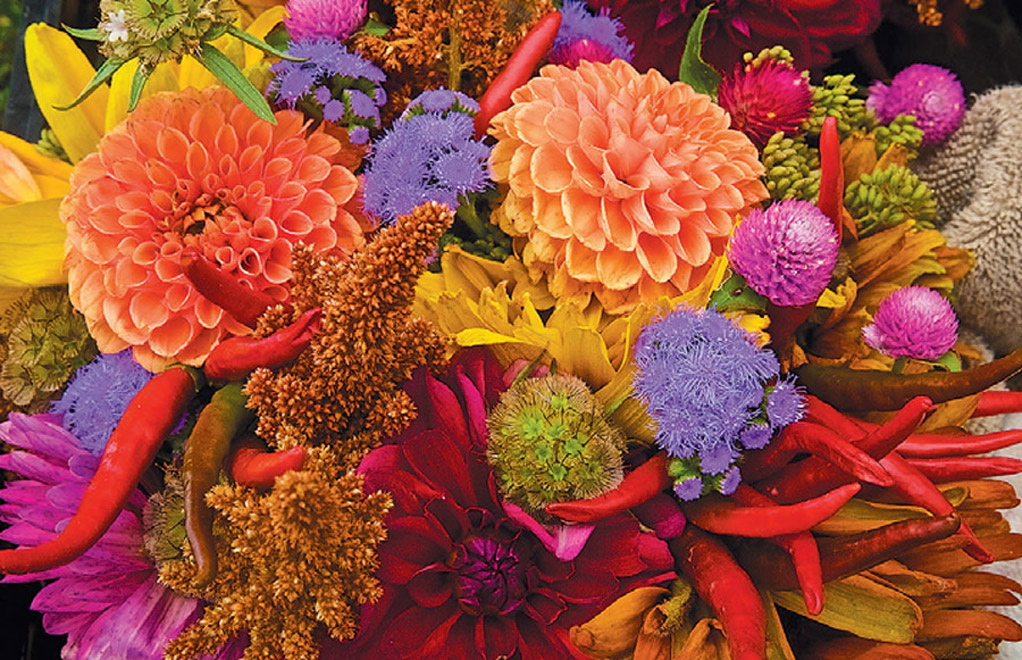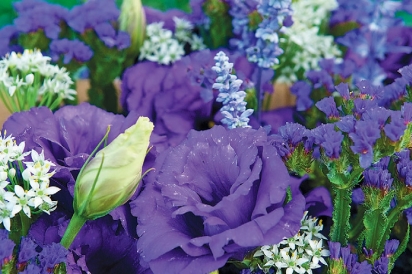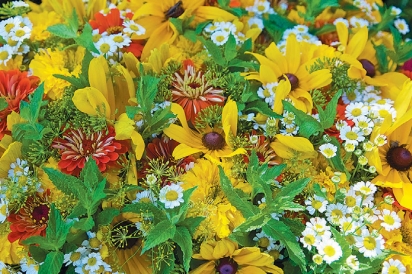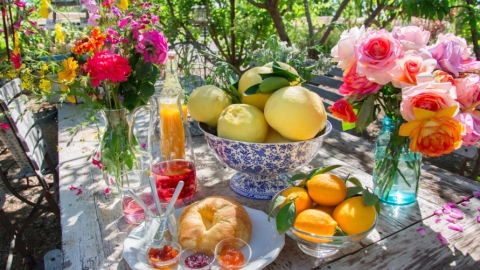Buy a Local Bouquet
The Sustainable Flowers Story
“Flowers always make people better, happier and more helpful; they are sunshine, food and medicine to the mind.”
— Luther Burbank (1849—1926, pioneer American agriculturist)
LUTHER BURBANK COULD not have imagined modern flower growing. In today’s world, that seemingly simple flower in your supermarket is the product of a $40 billion floral industry worldwide ($6 billion in the U.S.). Most flowers in the commercial market have been:
■ bred for long holding and transportation at the cost of fragrance and other desirable traits,
■ grown with environmentally degrading practices, poisoning land, water and the health of workers,
■ grown with abusive labor practices including child labor, sexual harassment, long hours, poverty wages, exposure to chemicals and lack of protective gear
■ transported thousands of miles on airplanes mainly from Colombia and Ecuador (those sold in Europe typically come from Africa), and/or
■ chemically fertilized, doused with herbicides, fumigated with insecticides and dipped in anti-fungals, most of which are not approved for food crops.
The result does not smell sweet. It is a tough, uniform and “perfect” product, much like a “perfect” winter tomato or “perfect” Red Delicious apple. Even though industrially produced roses look like a rose, something is missing: They have no scent.
Flower Confidential by Amy Stewart (Algonquin, 2008) details the international flower trade in all its terrible and wonderful aspects. It’s a good read if you want to learn more.
Local Flowers
But there is another flower story to tell, written right here in Arizona. Small-scale farmers are back in the business of growing local, seasonal, environmentally aligned, planet friendly, soil building, regenerative, socially just, humanity supportive, beautiful, fragrant and inspirational flowers.
Shanti Rade of Whipstone Farm seems to be the local flower growing guru. As a board member of the Association of Specialty Cut Flower Growers (ASCFG) and long-time member of the Slow Flowers movement, she supports and mentors many smaller growers. She farms north of Prescott (in Paulden, Arizona) with her husband, Corey, and their three children. With three acres in flowers, Shanti is the largest grower of local flowers in Arizona and sells to flower shops and a wholesale distributor in Phoenix.
If you ask her, she says flowers started as a business sideline to the vegetable market. But somewhere she got hooked on the beauty and joy of sharing them. Right now ranunculus are her favorite because they are among the first spring blooms, super gorgeous, with a long vase life. She specializes in bouquets of mixed flowers, herbs and flowering vegetables, arranged in a loose style that mimics the natural world.
At the southern end of the state Aishah Lurry grows local flowers at Patagonia Flower Farm. For Valentine’s Day she is working on dried flower heart wreaths. Aishah fills her small-scale, big-flower garden with lisianthus. She says they are her favorite because “they look fragile, like a rose, but they are tough and survive even out of water, even in our summer heat.” She’ll also have colorful amaryllis and flowering tulip bulbs to sell this spring.
Out in Rimrock (between Camp Verde and Sedona) Kate Waters has established another unique flower farm, Wild Heart. She’s excited to be turning this creek-side homestead into a pollinator habitat and retreat center. Her specialties are flowers with an ecological ethos like Hopi red dye amaranth. She says, “The bright red fronds dry well and the greens are edible.” This spring she delivers CSA shares to Flagstaff and Sedona and will be at the Flagstaff Farmers Market for Valentine’s Day. Kate chooses poems to complement her bouquets. “Flowers are so fleeting and so is poetry,” she explains. “They speak to the beauty of the moment. Poems and flowers go together. They leave you breathless.”
At South Mountain in Phoenix, Maya Daily of Maya’s Farm has added organic flowers to her certified organic vegetable plantings. Maya is excited about the mix of flowers coming along now: calendula, linaria, larkspur, sweet pea, cosmos, sunflowers, nasturtiums, bachelor buttons and zinnias. Some of these are sold as edible flowers for garnishing and decoration. Zinnias are Maya’s favorite. She says, “The colors are so vibrant and hot. They have a zest for life.” She describes her bouquets as “kinda wild ... very not typical.”
Steadfast Farms is located right in a Mesa neighborhood. Erich Schultz, farmer and consultant, loves having his customers nearby. Erich grows vegetables and flowers and is partial to celosia. He says, “Their bright colors and velvet texture make them unique.” In spring he features ranunculus because they grow really well in Arizona.
Anne E’s is all about health, fragrance and learning. Anne provides clean luxury flowers and fragrant fluffy roses. In addition to sweet scents, many of her bouquets contain edible flowers and interesting elements such as grapevines, olive and fig leaves, baby fruits, myrtle and lavender.
Emily Heller grows edible flowers, aromatic flower bouquets and specialty vegetables, herbs and fruit using organic methods in Arizona’s low desert. The business name is Bene Vivendo, which means “good living” in Latin. She offers an emotional experience. Emily says, “When you are reaching out from your heart it is an opportunity to capture the component that gives joy.” Both flowers and vegetables are selected and grown for beauty, texture, aroma, distinctiveness and surprise.
Now it’s spring in the valley, flowers are blooming. Local farmers are throwing their hearts and creative souls in with nature. Pick up a bunch, order a bouquet, plan a party, plan a wedding. All these flower growers welcome special orders. It’s time to open up and celebrate with nature. Go smell the flowers!
THE SLOW FLOWERS MOVEMENT
The Slow Flowers website (slowflowers. com) features a local and international directory, founder Debra Prinzing’s flower books (there are 10), the magazine Slow Flowers Journal, courses, training, networking and the Slow Flower Summit scheduled for June 2021. Listen to the Slow Flowers podcast with almost 500 interviews including #483 with Shanti Rade and #465 with Aishah Lurry at Apple podcasts.








